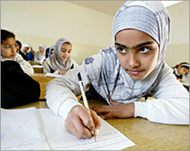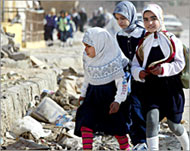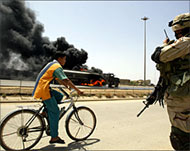Iraqi instability threatens education system
Every day an elderly woman swaps her mop for an AK-47 rifle and stands guard outside a primary school in central Baghdad.

School caretaker Um Muhammad has been forced to take radical measures as Iraq’s lawlessness continues and her school is in danger of looting and vandalism.
Spates of robberies and break-ins have left teachers in fear of their lives and many parents fearing their children will be kidnapped.
The choice is stark – remove children from school or leave them at the mercy of thieves and kidnappers.
But the situation for those children who do regularly attend school is far from ideal.
After years of war, US-supported UN sanctions and neglect, Iraq’s educational standards leave a lot to be desired.
In reconstruction talks held last year, the World Bank agreed to provide $100 million to help ensure Iraqi children get a good education.
But experts say the international and US funding that is being injected into the education system is only the tip of the iceberg of what Iraq’s ailing school infrastructure actually requires.
Disillusionment
Many Iraqi parents feel there is no hope for their children in occupied, post-Saddam Iraq.
|
“The situation was terrible under Saddam because of war and sanctions but now the occupation has produced nothing but uncertainty and chaos so there is almost no hope” Karim Latif, |
Karim Latif, an unemployed father of three from Baghdad, is so desperate that he has considered sending his children to be schooled abroad.
“I think Iraqi teachers are very dedicated but they lack the training and the facilities to do their jobs properly,” he told Aljazeera.net.
“The situation was terrible under Saddam because of war and sanctions but now the occupation has produced nothing but uncertainty and chaos so there is almost no hope.”
Karim’s children go to the Shatt al-Arab school for 6-12 year olds in west Baghdad.
In many ways, the school is a microcosm of the education system.
The classrooms are lacking in furnishing and equipment and appear to be crumbling; the whole building is in dire need of painting and repairs.
Underfunded
On the positive side, the student-teacher ratio is comparable to Western standards, and the children seem to get a reasonably good education in mathematics, Arabic language, arts and crafts, and sports.
It is clear they have an obvious appetite to learn, and the teachers are caring and dedicated.
But headteacher Iqbal Hamad al-Jumaili told Aljazeera.net that every school day is a struggle.
“We are desperately underfunded. We get $750 a year from the government but we need around $2000 a year for all our expenses. We end up footing some of the bills through our own pockets.”
 |
|
Iraq used to have a distinguished |
Nevertheless, al-Jumaili says things are slowly improving.
During the 1990s, teachers used to earn an average equivalent of $3 a month, but that has significantly improved in recent months.
“It was like working for free and we used to do it because we weren’t prepared to see our children go without an education. But now teachers get $250 a month which is respectable.”
Al-Jumaili reveals that it is the hope and aspiration of all Iraqi teachers that Iraq’s education system regain its stature and become as modernized as standards in the Gulf.
“We want our children to have access to the internet and science laboratories. At the moment teachers are doing their best without government help,” she says.
Former glories
Like many other headteachers, al-Jumaili, who is disabled, guarded her school from looters in the aftermath of the foreign invasion.
“After the war last year there were big problems with things like electricity and the water supply to the school. But the major headache was security,” she said.
“There was no security because the Americans did not have a plan for after the war. I was forced to stay here with my husband to guard the school.
“And even now parents are scared to send their children here because of the dangers.”
 |
|
Iraqi females were once the most |
The irony is that Iraq once had a distinguished education system that produced graduates who went on to higher studies in the US, UK, France and Russia with the government footing the bill.
The students would then return to Iraq and share the expertise.
According to the United Nations Educational Scientific and Cultural Organization (UNESCO), Iraq’s education system was one of the best in the region prior to the 1991 US-supported UN sanctions.
UNESCO says that primary schools were fully subscribed and there were high levels of male and female literacy.
Education crisis
Higher Education, especially scientific and technological institutions, was of an international standard, staffed by high quality personnel.
But by the mid-1990s, says the United Nations Childrens Fund, the education sector was in deep crisis.
In 2002 UNICEF reported the education system’s physical infrastructure was dilapidated, and its teaching personnel were completely dissipated in the face of shrinking funds.
Female literacy rates dropped from 87% in 1985 to 45% in 1995.
More than 16,000 teachers who would not normally have left their profession did so between 1990-96.
And by 2000, 31.2% of girls and 17.5 % of boys did not go to school as a result of Iraq’s impoverishment.
Under the sanctions regimen, even pencils could not be imported into the country because of their lead and graphite composition.
The situation was so bad that Iraqi emigrants were routinely contacted by their diplomatic missions and asked to send medical and engineering books back home.
Sanctions condemned
A UNICEF report on Iraq said: “The paucity of resources available to both planners and families…means that schools have remained in a deteriorated condition for over a decade and teachers’ salaries are on the poverty line.”
 |
|
The dire security situation is a |
It added: “The past decade has witnessed the emergence of a large body of wasted, stunted and impoverished children.
Global Policy Forum, a respected UN monitoring group, blames Iraq’s educational collapse on the US and British-inspired sanctions.
In a 2002 report, the organisation said: “It is now clear that comprehensive economic sanctions in Iraq have hurt large numbers of innocent civilians…by disrupting the whole economy, impoverishing Iraqi citizens and depriving them of essential income.
The report claimed that the most vulnerable members of Iraqi society – the impoverished – were the most hard hit by sanctions.
It stated that the “primary victims of the sanctions – children, the elderly, the sick, the poor” were also those least responsible for their government’s policy and the most incapacitated to influence it.
This was the situation the US-led occupation inherited after they ousted Saddam from power in April 2003.
No hope
Iraq’s education minister, Ala al-Din Alwan, admitted in March this year that the school system needed billions of dollars in aid to overcome the adverse effects of the previous decade.
However, he claimed about 2500 schools had been renovated since the US-led invasion, although much more money was needed to build new schools and massively overhaul others.
Shatt al-Arab School’s al-Jumaili doesn’t see any light at the end of the tunnel, however.
“I am not hopeful. At the moment the education system is in a mess. As long as the Americans stay there will be no security, but when they leave I think the education ministry will keep all the money for themselves,” he says.
“I just pray the kids in my school stay in Iraq because they have to build a future for our country. If they don’t, who will?”